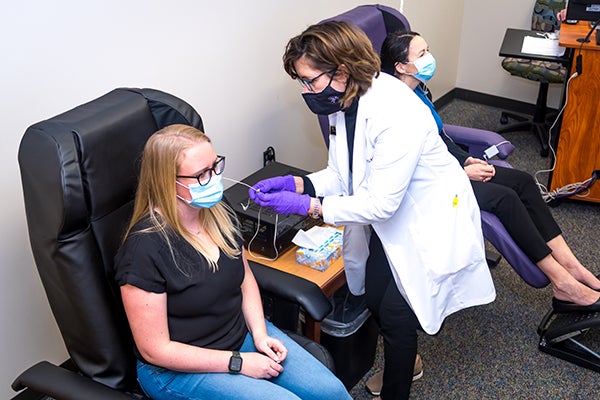Biofeedback Lab uses collaborative projects to benefit eastern North Carolinians
A team of health researchers from East Carolina University have been using biofeedback to help patients manage involuntary bodily functions such as blood flow, blood pressure and heart rate. Now, they’re examining their work’s potential uses for those recovering from COVID-19.
The Biofeedback Lab is led by Dr. Linda Bolin, assistant professor in the College of Nursing’s Department of Nursing Science and is housed in the Health Sciences Building. There, the team examines how biometric markers such as blood pressure can be communicated in real-time, allowing the user to connect have a deeper understanding of their body’s health in the moment, and make adjustments accordingly. Projects based in the lab include undergraduate and graduate students and faculty from the College of Health and Human Performance and the College of Allied Health Sciences’ Department of Addiction and Rehabilitation Studies.
Through biofeedback, a person is connected to electrical sensors that help them receive information about their body.

Dr. Linda Bolin and PhD student Amelia Saul demonstrate sensors and equipment used in biofeedback, which helps patients manage involuntary bodily functions including blood flow and heart rate. (Contributed photo)
“Biofeedback training teaches the participant how to self-regulate their physiology. Through self-regulation, the participant may gain a sense of autonomy because they begin to realize how the mind-body connection works,” Bolin said. “Through small changes such as taking 10 minutes to practice paced breathing, an individual can begin to improve their overall physical and mental health.
“Our lab lends to this through providing equipment to help the participant learn the basics. Once the participant understands how to practice paced breathing, they will no longer need to follow a monitor that tells them when to inhale and exhale, it will become like muscle memory, and they will be able to practice on their own without needing the equipment.”
That system is being used in a new study to determine if heart rate variability monitoring could be used as an indicator that enhanced treatment is necessary —from a primary care provider, in the emergency department, or via hospitalization—in COVID-19 patients in self-quarantine. Through telemedicine monitoring, researchers led by Bolin and Dr. Nick Murray in the College of Health and Human Performance are using biofeedback to guide patients to self-monitor stressors of COVID-19 to try to decrease the chances of hospitalization.
“Using biofeedback software, our research team can monitor patients while they are at home remotely through our telehealth system,” Bolin said. “The participants complete a baseline assessment at the beginning of the study and their data is compared over time to see if changes occur. We also check in with the participants daily to ensure that no changes either physically or psychologically have occurred.”
The study began enrolling patients in August 2020, and seven participants have completed it so far. Data is still being analyzed.
“Currently, there is little known about how COVID-19 impacts an individual’s physical and mental health while recovering at home,” Bolin said. “In addition, there are no means to monitor COVID-19 patients’ cardiovascular risk, physical changes or symptoms. Recognizing those at highest risk for early intervention could prevent cardiorespiratory injury.”
Biofeedback for at-risk young adults
An exploratory study, “Biofeedback for At-Risk Young Adults with a Family History of Cardiovascular Disease” is examining heart rate variability and continuous blood pressure monitoring during a breathing application in a study group of eastern North Carolinians between 18 and 35 years old. This pilot project is providing data for the early identification of undiagnosed elevated blood pressure and the effect of using self-management strategies.
In 2018, Bolin was awarded a $25,000 grant for the project from the ECU Medical & Health Sciences Foundation. The project stemmed partly from Bolin’s experiences as a nurse practitioner at ECU Student Health Service, where she noticed a trend of young adults with high blood pressure.
“As researchers, we carefully assess current health issues along with the needs of the region,” she said. “Through collaborative efforts of brainstorming and deep mind thinking, ideas are generated. As a nurse scientist, I possess the spirit of inquiry.”
Bolin’s research has led to explorations of the experiences of biofeedback participants.
The Biofeedback Lab is a collaborative effort than spans both ECU campuses, including providers from the Department of Addiction and Rehabilitation who also work in the Navigate Counseling Clinic, the College of Allied Health Sciences’ free clinic that offers counseling services to individuals, families and groups. Undergraduate and graduate students in the College of Nursing also work on various research projects as well as HHP’s Departments of Kinesiology and Recreation Sciences.
Through the support from the ECU Medical & Health Sciences Foundation, Bolin has been able to work on a variety of research projects and share the findings through poster and podium presentations and manuscripts. Through collaborative work, the Biofeedback Lab provides an avenue for student learning, services to the public and solutions for the health of the region.
“Without the grant start-up monies, none of this would have come to fruition,” Bolin said. “It is our hope that our Biofeedback Lab will provide valuable information to help those living in eastern North Carolina, both in terms of primary and secondary prevention of disease processes.”